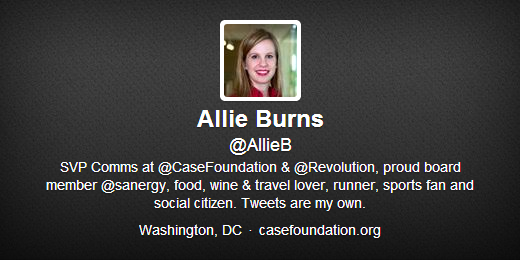Whose opinions are these now? Fix your brand and we won’t wonder…
January 5, 2014, 6:09 PM
One of the most ridiculous things to come out of social media over the last few years is the Twitter disclaimer. I’m sure you’ve seen these things before. They usually look something like this:

(I promise I’m not deliberately singling @AllieB out by picking her profile to use as the example. This is not the only one like this, nor is this the worst offender by any means.)
My understanding is that these things are intended to protect employers from liability if their employees say something untoward, and to say that yes, this is, in fact, a personal account. My view on this matter is that these things are completely unnecessary, and that too many people use these disclaimers as an excuse to be sloppy about how they brand themselves on the Internet.
I expressed my thoughts on the matter a few weeks ago when responding to an article by Jessica Miller-Merrell called “5 Employee Twitter Bio Disclaimers You Should Add Today“:
The idea of a “my opinions are my own” social media disclaimer in general is a bad idea, as I consider it tantamount to apologizing for having the capability to think and reason for yourself, and to be able to form your own opinion.
If individuals and their employers want to create a separation between personal and professional communications in social media (and there are very valid reasons to do that), then rather than request that employees create stupid little disclaimers, they should ask that the employees not brand their personal accounts in a way that implies or makes one potentially believe that the person behind the account is speaking on behalf of their employer. I find it amazing how many people brand themselves entirely in the context of their work on their personal Twitter accounts, and then disclaim that the tweets are endorsed or approved by their employer. Not only does it give the impression that such people are rather one-dimensional and that they can only define themselves by what they do for a living and have no other interests, but it also connects their personal online identity with that of their employer. With, that, it blurs the line between personal and professional, and makes it difficult to know for sure whether one is speaking as an individual or as a representative of their employer.
I like to think that I’ve created a good separation in my online branding. The bio on my @SchuminWeb Twitter account, as of this writing, is, “Ben Schumin and The Schumin Web. Ya know.” There’s also a link to my website, The Schumin Web. There is no ambiguity about who the person behind the account is speaking for because it contains no branding for any entity other than myself.
If more people would simply brand themselves as themselves and only themselves, rather than branding themselves in the context of their employer, then all of these ridiculous Twitter disclaimers would sort themselves out.
The bottom line is that if you brand yourself in the context of your employer, then it will give the appearance that you are speaking on behalf of your employer, no matter what you say or how much you insist otherwise. In the example above, the person lists their job and their professional affiliations first, then described themself, and then disclaimed their tweets as being only their own. The tweets themselves seem to indicate that this is, in fact, a personal account. However, since the first thing we see is that they are the senior vice president of communications at whatever organization, then it is reasonable to think that they are speaking on behalf of the organization, or at least that there is some connection between what they’re saying here and any official communications on behalf on their employer. So the question becomes, why even allow people to make that connection in their heads by including one’s employer in the branding for a personal account? People should learn how to identify themselves as themselves. Plus, unless your employer is separately paying you for ad space on your personal accounts, why give them the free advertising? Now if someone has a Twitter account that they use exclusively for official communications on behalf of their employer, that account should be branded entirely (and only) in the context of one’s employer. And then that person should have a separate personal account that’s not branded in the context of their employer in any way.
As I see it, if someone can only describe themselves in the context of their work, then I feel sorry for them. If a person’s job is their entire life, then, I’m sorry, that is not a very fulfilling life. Certainly such people are not so one-dimensional that they have no outside interests. Do you read anything? Do you collect anything? What do you do in your spare time? If someone is running a personal Twitter account, then that’s the kind of stuff that the person behind the account should use to brand themself.
Then there’s the view that we need to explicitly say that something is a personal account with the “my opinions are my own” or “views expressed here do not necessarily represent the views of my employer” and other such garbage for purposes of making sure others know this because they may not be able to distinguish it for themselves. No. If others can’t distinguish personal from professional, then it means that the person has done a sloppy job with their branding. That’s what Twitter disclaimers are at their core: a band-aid over sloppy branding. Who a person is speaking for should be painfully obvious if done right, without any disclaimers or apologies.
I like to think that I’ve done a pretty decent job at keeping things separate over the years. I brand myself online more or less exclusively in the context of this website. I discuss my own interests. If there are interests that overlap with that of a company, I’m happy for you. It doesn’t mean that a company owns the concept and can control the way that I display that message on my personal website. After all, they’re not paying me to operate this website. Once I get paid, what I do with the money is my business, and if I choose to run a website, that’s my business. I have been asked in the past to put one of those stupid “my opinions are my own” disclaimers on Schumin Web. My answer has always been “no”, and that will always be my answer. First, I’m the only one who pays to run this website. As my mother has said before, “You have to pay to say.” Plus I like to think that I follow various best practices about how to brand myself. If I’m writing for myself, then I will be putting Schumin Web’s brand on it. If I’m writing on behalf of someone else, then that content will be released under that entity’s brand rather than mine.
All in all, I think this is a pretty simple concept. We are all special in our own ways, and that’s what makes us individuals. When it comes to branding personal accounts, that’s what people need to use, and not label themselves in the context of their employer. And a good personal brand renders the stupid Twitter disclaimer entirely unnecessary.
Categories: Social media










